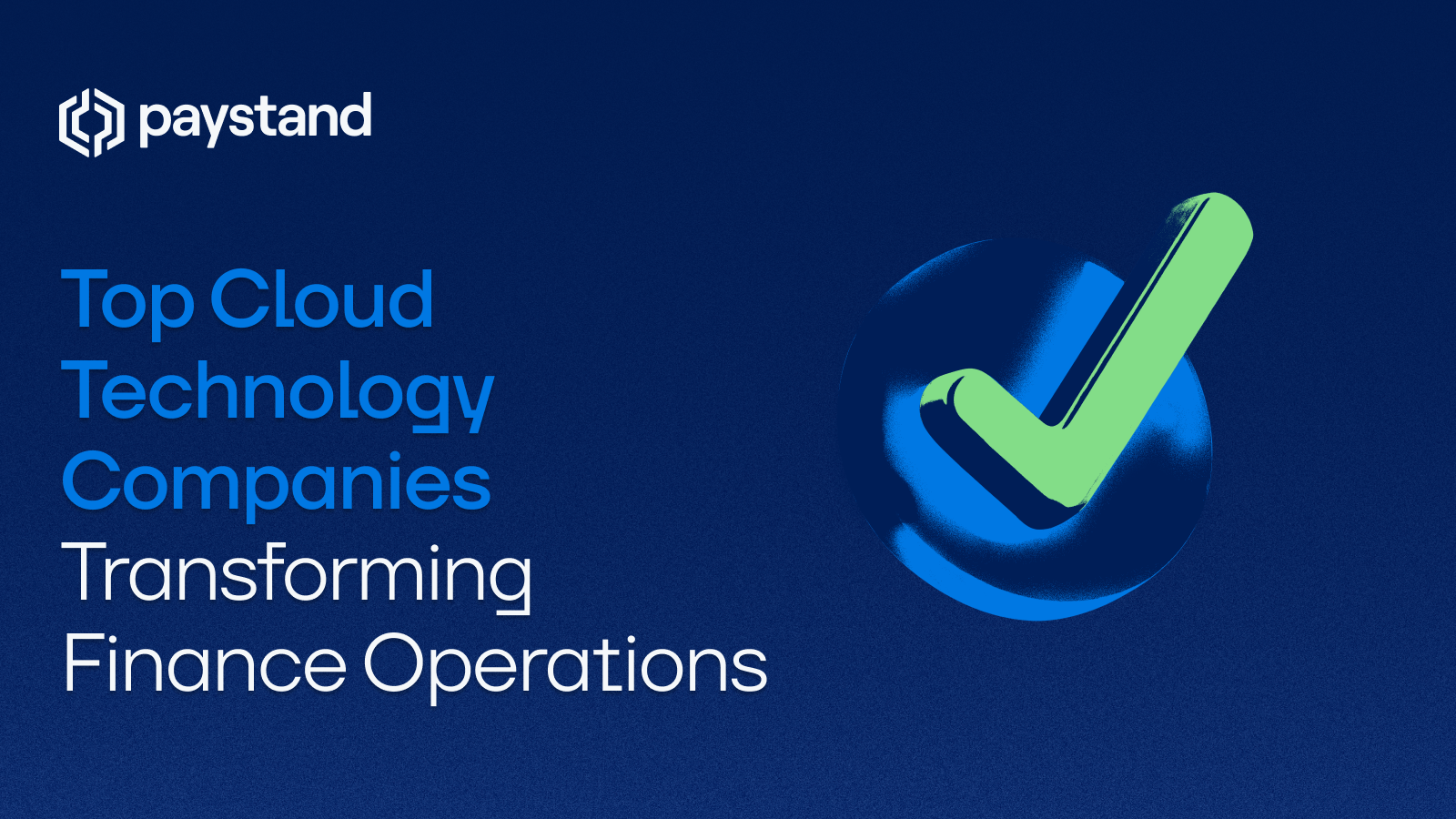Top Cloud Technology Companies Transforming Finance Operations

Table of contents:
- What Is a Cloud Service Provider?
- What Cloud Technologies Are Leading the Market?
- Eleven Top Cloud Technology Companies
- Take Your Accounting to the Next Level
Key takeaways:
- Cloud service providers help businesses reduce infrastructure costs, scale faster, and modernize critical workflows.
- The cloud market includes hyperscalers, enterprise SaaS leaders, data/AI platforms, and finance-specific cloud innovators.
- Below are eleven top cloud technology companies shaping how modern organizations build, operate, and grow.
Cloud technology is now the foundation of how modern businesses run. From core infrastructure to the applications teams use every day, cloud platforms power faster collaboration, scalable operations, and real-time decision making.
For finance teams, the impact is especially big: cloud solutions reduce manual work, improve cash visibility, streamline approvals, and connect payments directly to ERPs.
But “cloud technology companies” can mean a lot of things. Some provide the underlying infrastructure that businesses rely on. Others deliver software, security, data, AI, or cloud-native financial operations. To help you navigate the landscape, here’s a simple breakdown of what cloud service providers are, what cloud technologies are leading the market, and the top cloud technology companies driving innovation today.
What Is A Cloud Service Provider?
A cloud service provider (CSP) is a third-party company that delivers on-demand computing resources over the internet. Instead of purchasing and maintaining expensive on-premise hardware and software, organizations can access cloud-based infrastructure, platforms, and applications through subscription or usage-based models.
Cloud services typically fall into three categories:
-
Infrastructure as a Service (IaaS): compute, storage, networking, and databases
-
Platform as a Service (PaaS): development environments and tools to build cloud apps
-
Software as a Service (SaaS): complete applications delivered via the cloud
The result is lower IT overhead, faster deployment, stronger security, and the ability to scale up or down without rebuilding your tech stack.
What Cloud Technologies Are Leading the Market?
The cloud market is broad, and it’s growing because it supports nearly every business function. Today’s leading cloud technologies include:
-
Public cloud infrastructure for global compute and storage at scale
-
Enterprise SaaS platforms that run operations like CRM, HR, and finance
-
Data and analytics clouds that unify business intelligence and reporting
-
AI/ML cloud platforms that help teams automate workflows and model outcomes
-
Security and identity clouds that protect distributed systems and users
-
Cloud-native finance platforms that modernize payments, billing, and cash flow
You don’t have to rely on one provider for everything. Most modern stacks combine hyperscalers with specialized cloud platforms depending on the workflow
Eleven Top Cloud Technology Companies
We researched the market and selected 11 top cloud technology companies based on scale, innovation, reliability, enterprise adoption, and the impact they’re having across industries.
1. Amazon Web Services (AWS)
AWS is the world’s largest cloud infrastructure provider, offering scalable compute, storage, databases, analytics, AI, and developer tools. Its breadth of services makes it a backbone for startups and global enterprises alike.
2. Microsoft Azure
Azure is a leading enterprise cloud platform with deep integration across Microsoft’s ecosystem. It’s widely adopted by large organizations for cloud migration, hybrid cloud, and application modernization.
3. Google Cloud Platform (GCP)
GCP is known for strength in data engineering, AI/ML capabilities, and cloud-native infrastructure. It’s a major player for organizations building modern analytics and AI stacks.
4. Oracle Cloud Infrastructure (OCI)
OCI is a top cloud choice for businesses running Oracle databases or ERP systems. It offers high-performance infrastructure optimized for enterprise workloads.
5. Salesforce
Salesforce is a cloud giant in CRM and customer operations. Beyond sales and service, it powers whole ecosystems of business apps through its cloud platform.
6. ServiceNow
ServiceNow helps enterprises automate workflows across IT, operations, HR, and more. Its cloud platform is a leader in digitizing and orchestrating cross-team processes.
7. Workday
Workday is a top cloud provider for finance and HR systems. It supports real-time planning, reporting, and operational management for large organizations.
8. Snowflake
Snowflake is a leading cloud data platform that enables secure, scalable analytics across teams. It’s widely used for modern BI, data sharing, and enterprise data strategy.
9. Databricks
Databricks powers cloud-scale data engineering and machine learning through its “lakehouse” platform. It’s a major force behind AI-ready enterprise data stacks.
10. Stripe
Stripe provides cloud payments infrastructure for internet businesses and platforms worldwide. Its APIs enable fast, flexible integration for modern commerce.
11. Paystand
Paystand is a cloud-native B2B payments network designed to modernize accounts receivable. By embedding payments directly into ERP workflows, Paystand helps finance teams automate invoicing and collections, reduce transaction costs, and accelerate time-to-cash — all without the friction of legacy fee-based models.
The Profit Paradigm Podcast
We're flipping the script on finance. No fees. No friction. Just pure cash-flow power. If you're ready to automate, accelerate, and take control of your revenue, this is where the future of money movement begins.
Take Your Accounting to the Next Level
Cloud technology isn’t just about where your data lives — it’s about what your teams can do with it. When your core systems are cloud-connected, finance teams can eliminate manual processing, improve forecasting, and get paid faster.
If you’re ready to modernize AR and streamline payments inside your ERP, Paystand makes it simple to automate the entire cash cycle — from invoice to reconciliation.
Want to see how AI and cloud workflows are reshaping finance?
Check out our eBook: How Finance Teams Use AI to Drive Better Decisions.






